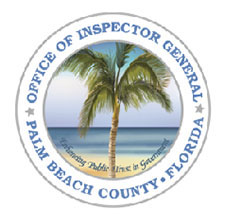BY PAUL GABA
The endless debate over funding Palm Beach County’s Office of the Inspector General (OIG) continues to be a back-and-forth match with no end in sight, despite recent legal rulings.
The topic was among those discussed at a joint meeting of the Palm Beach County Commission and Palm Beach County League of Cities on Wednesday, July 19, with the municipalities pushing back against requests for funding assistance from county representatives.
The forum, held at the Wellington Community Center, was only for discussion and informational purposes. No proposals were formally offered, and no votes or actions were taken. The morning focused on presenting information about six areas of mutual interest to county officials and municipal leaders: tourism; mobility and impact fees; affordable and attainable housing; homelessness and the opioid epidemic; workforce training; and OIG financing.
The OIG was created in 2010 after a series of high-profile government corruption scandals in Palm Beach County. While a majority of voters in the county and in each of its municipalities backed the move, 15 municipalities sued to block the county’s chosen financing method, which assessed each municipality to help fund the office.
After a long court battle, in December 2016 the 4th District Court of Appeal sided with the municipalities, meaning that the county is currently on the hook to cover all OIG expenses in its proposed $3.1 million 2018 budget, which is far short of the office’s original envisioned funding level. The county has chosen not to appeal the decision.
Using a PowerPoint presentation before an audience of approximately 100 municipal and county officials and employees, Palm Beach County Budget Director John Wilson outlined the OIG’s financial situation and fielded questions about the budget process.
County Commissioner Steve Abrams noted while there is “no requirement based on litigation [for the municipalities to help fund the program], there has always been this good faith, based on that the inspector general does good work, for municipalities to participate in funding.”
The central question, Abrams said, is to what extent the county’s 39 local governments would help finance the OIG’s operations.
Wellington Mayor Anne Gerwig voiced concern over the expansive reach of the OIG, noting that municipalities are already required by the state to do outside audits every year.
“We are overlapping on this,” she said. “If we are going to be working together on this, we need to have some idea of the constraints of the budgeting. The real problem is, we do not have any input over the process — it’s a function of the county. From the cities’ standpoint, we have nothing to do with the process.”
Gerwig also criticized the OIG for a lack of transparency, noting that at one point there were 14 OIG investigations of Wellington departments underway, “but we were only aware of two. We need an open line of communication,” she said.
Leonard Berger, the county’s chief assistant attorney, said that while the county is involved with the OIG’s budget, it is essentially an independent agency outside the county’s oversight.
Berger said full OIG independence was shot down by the state in 2009, and the only alternative was to create the office through a county ordinance.
“You can’t just create a separate governing body,” Berger said. “We had to go through a local ordinance, but it is functionally independent. The board that oversees it is the Inspector General Committee, and they review and make [hiring] selections. We did everything in our power to make it as independent as possible.”
The governing committee is composed of the five-member Commission on Ethics, plus Public Defender Carey Haughwout and State Attorney Dave Aronberg.
Berger said there are still options to return to Tallahassee and try to convince state officials that the OIG should be a truly independent entity.
County Commissioner Hal Valeche said that while the OIG is “structurally part of the county, in other areas, it is fully independent, and should really be thought of as an independent body.”
The OIG provides a valuable service to both the county and the various municipalities, he said, “for which there should be consideration of financial exchange. It should be able to bill everyone who needs its service.”
Town of Palm Beach Mayor Gail Coniglio, a League of Cities board member, said that since municipalities already pay the county ad valorem taxes, they are already helping to pay for the OIG.
County Administrator Verdenia Baker said while it is true that property taxes are collected by the county, that money goes to many different areas.
“We fund a myriad of projects,” Baker said. “All of our taxpayers pay countywide taxes, but there is a limited source of revenue from that [for funding the OIG.] We are asking cities to come to the table and share in the costs. We need to talk about the levels of service, but the inspector general would answer to that level of service. We believe it is beneficial for all cities to come to the table.”
Baker said the county is looking for “a partnership” between the OIG and the municipalities within Palm Beach County.
“Who is going to pay here seems problematic,” said North Palm Beach Vice Mayor Robert Gebbia, second vice president of the League of Cities. “This is a countywide effort and the [county] commission has the financial responsibility. Thirty-nine municipalities are short on money, too. No one is saying we don’t need an inspector general. We just need to decide where to put those dollars, and it seems the county is the logical place to put that.”
For a full overview of the proposed 2018 OIG budget, visit www.pbcgov.com/oig.








